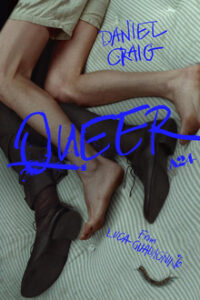Queer-2024
Director Luca Guadagnino
Starring Daniel Craig, Drew Starkey
Scott’s Review #1,462
Reviewed January 20, 2024
Grade: A
Daniel Craig sheds his James Bond (007) image for a more nuanced and challenging role in Luca Guadagnino’s film, Queer (2024). His layered and complex character must have been a dream role for the actor reportedly frustrated with the one-note Bond character.
Guadagnino, well-known for the similarly LGBTQ+-themed Call Me By Your Name (2017), trades Italy for Mexico and later Ecuador in his latest and darker project.
The film is a winning ticket and on an even keel with Call Me By Your Name, although I prefer the latter by a smidgeon. Queer is an exceptional film given the fabulous combination of elements like muted color tones, unrequited love, and the 1950s time period.
The sex scenes are pretty delicious and leave nothing to the imagination, providing titillation and appetite.
I was impressed by the unique incorporation of 1990s grunge band Nirvana in various sequences, including a beautiful rendition of ‘All Apologies’ by Sinead O’Connor as the film opens.
The funky, crisp blue/purple credits, which appear handwritten, are cool and modern, adding to the visual pleasures to come.
Events begin in 1950 when we meet William Lee (Craig), an American expatriate living in Mexico City, passing time by bar hopping and indulging in sexual activities with younger men.
One evening, he catches sight of Eugene Allerton (Drew Starkey), a young GI who is also an American expatriate. Lee becomes obsessed with Allerton and pursues him across various bars, hoping to gain his affection.
The men develop a relationship, but Eugene maintains an emotional distance from Lee. Despite Lee’s interest in a full-time connection, he is often seen with a mysterious red-haired woman.
As time marches on, Lee’s dependency on drugs and alcohol deepens, and the pair take an exotic and hallucinogenic trip to Ecuador to visit a wacky female doctor (Lesley Manville).
Will Lee and Eugene forge a dangerous same-sex relationship? Or will they go their separate ways as merely two ships passing at night?
The character of Lee is reportedly based on William S. Burroughs, a famous American author during the Beat Generation (a literary subculture of the 1950s).
His 1985 novella, Queer, is adapted.
Craig is dangerously good as Lee, invoking loneliness and hopefulness seemingly interchangeably in a given scene.
He’s relatively out of the closet, miraculous given that the gay rights movement would not happen for almost twenty years, but this begs the question of the progressive culture of Mexico City.
The audience realizes that Lee is yearning for a connection with another man and has repeatedly been unable to find it. Sure, he pays for the services of male prostitutes, but it’s not about the sex for him.
It’s a more profound desire.
As Lee embarrassingly admits his feelings for Eugene in a drunken confessional, Craig flawlessly reveals Lee’s pain. The actor rises way beyond the heights of James Bond in an acting extravaganza.
I adore the texture that Guadagnino films in. The gloomy streets and the fuzzy colors add the proper setting of emptiness and fulfillment.
Lee’s artist apartment is, in one way, calm and, in another way, bleak and shrouded with unhappy experiences. It’s littered with empty bottles and discarded drug paraphernalia.
The moments when Lee and Eugene are together in a movie theater or out to dinner when Lee imagines the pair embracing or stroking the young man’s face, are both tender and sad.
While the film doesn’t end happily, anyone familiar with Call Me By Your Name shouldn’t be surprised. Instead, Guadagnino showcases the reality and desperation of what being gay was like a long time ago.
It will not satisfy everyone, and the story teeters off course toward the end when the men get to South America, but the score and dazzling visuals make up for this.
Thanks to superior direction and a lead performance of excellence, Queer (2024) is a grand achievement in humanity and the complications that emerge when faced with emotions and desires that are not fulfilled.

